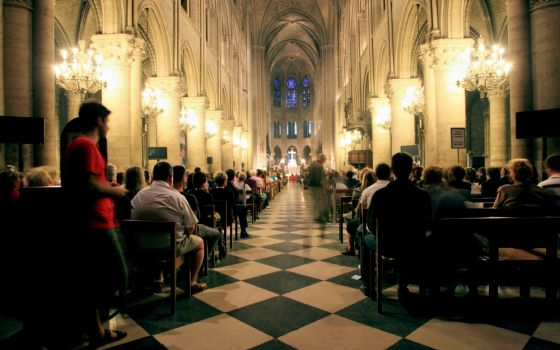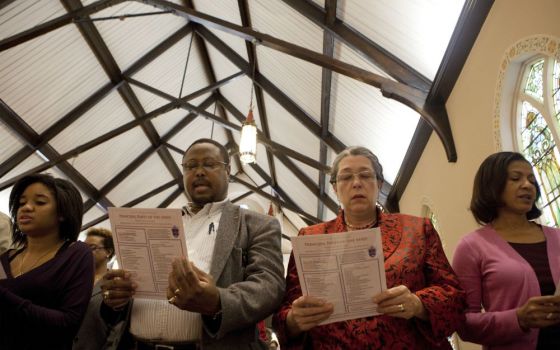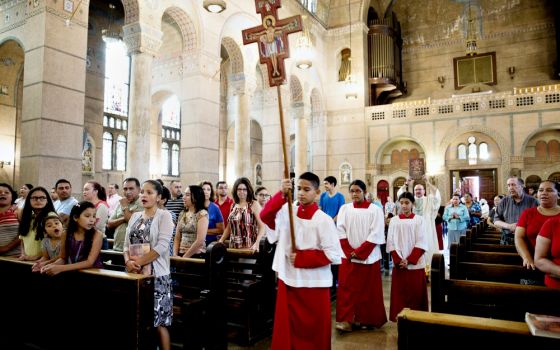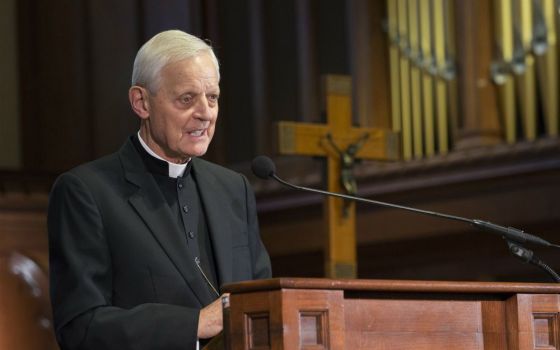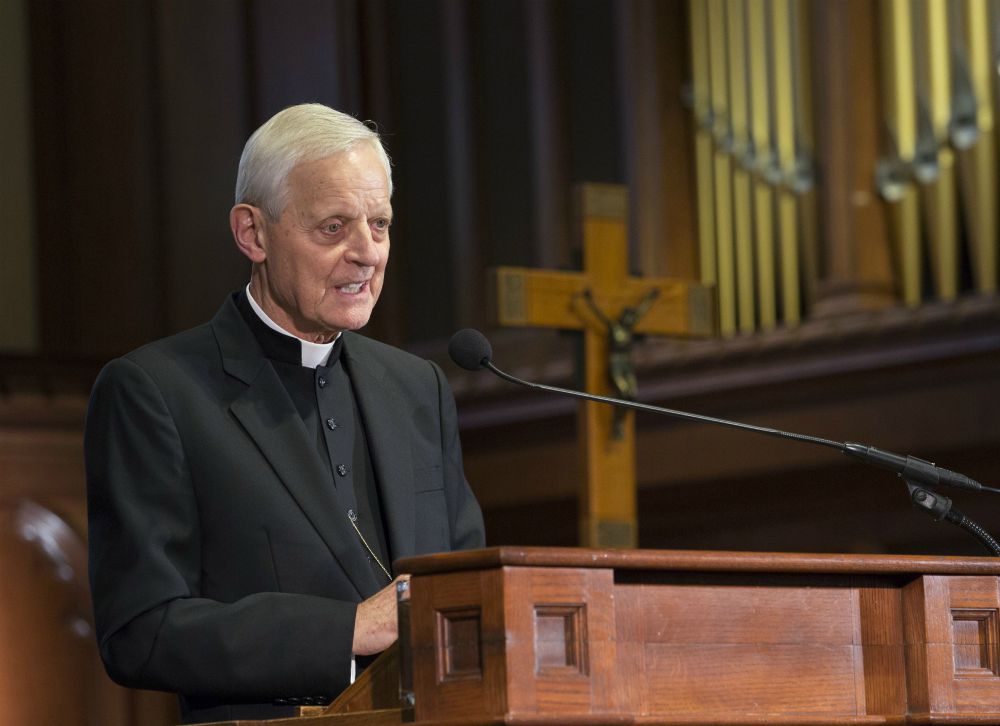
Cardinal Donald Wuerl of Washington delivers a keynote address prior to a panel discussion on "Lives Worthy of Respect" at Georgetown University in Washington Oct. 2. (CNS/ Catholic Standard /Jaclyn Lippelmann)
In decentralizing authority from the Vatican to bishops' conferences for the translation of texts for the Catholic Church's liturgies from Latin into local languages, Pope Francis is simply putting in place a reform called for by the 1962-65 Second Vatican Council, said Washington Cardinal Donald Wuerl.
Speaking in an interview with NCR Oct. 24, Wuerl said: "The council clearly said this was the responsibility of the bishops, these translations — in communion, obviously, with Peter."
"Now, we have Pope Francis saying, 'Isn't this what the council said?'" Wuerl said. "'Shouldn't we be doing that?'"
Wuerl was responding in the interview to a question about Francis' Sept. 9 motu proprio Magnum Principium ("The Great Principle"), in which the pontiff moved most responsibility for Catholic liturgical translations from the Vatican to local bishops' conferences.
During the half-hour interview, the cardinal also addressed how he thinks Catholic institutions should respond when they come under pressure from online groups to disinvite scheduled speakers.
To demonstrate his point on Francis' changes to the liturgical translation process, Wuerl referred to bishop friends in Asia, India and Africa.
"They tell me about the translation … of liturgical texts into a dialect," he said. "They said, 'If we send it to Rome, who would know that dialect anyway? They're going to have to rely on my faithfulness.'"
"And I think that's probably what the pope was getting at, saying, 'Isn't that what the council said?'" said Wuerl.
The cardinal also referred to an open letter Francis recently wrote to Cardinal Robert Sarah, the prefect for the Vatican's Congregation for Divine Worship and the Discipline of the Sacraments.
In that letter, released by the Vatican Oct. 22, the pope told Sarah that liturgical translations should have a "triple fidelity": to the original Latin text, to the language into which it is being translated, and to the comprehensibility of the text for those who will use it.
"You put all that together, what I'm hearing the pope say in the most recent document is that's a collaborative effort, but two parts of it, of those three elements, are best done locally: the fidelity of the text of this translation and its comprehension," said Wuerl.
Describing his understanding of Francis' respect for the authority of local bishops, Wuerl recalled a story from Francis' 2015 visit to the United States.
Wuerl said that as part of organizing the Mass the pope celebrated in Washington to canonize 18th century Franciscan Fr. Junipero Serra, he decided to have a reading in the local language of one of the Native American tribes Serra worked with in what is now California.
Advertisement
The cardinal contacted a California archbishop, who had a priest who knew the language translate the selected passage. Once the translation was finished, Wuerl sent it to be verified by the Vatican's worship congregation.
As the celebrants for the Mass were getting ready for the ceremony, Wuerl said he approached Francis to let him know about the reading and the process behind getting it approved.
"I said, 'Holy Father, I want you to know this is totally legitimate,' " the cardinal recalled. "He said, 'Why didn't you just approve it?' — meaning, 'You're the bishop here.' "
Not bearing false witness
Wuerl spoke about how Catholic institutions should respond when they come under pressure from online groups in the context of a question about the treatment of people such as Jesuit Fr. James Martin, who was disinvited from a scheduled September event in Washington at the Theological College at the Catholic University of America after a campaign among far-right church groups.
While he did not speak about Martin's case specifically, he said that in the new social media environment Catholics should be encouraged to "speak the truth in love."
"That means you have to verify what it is you're saying," said Wuerl. "It just can't be your announcement of something as if it were the truth. And even if you verify something to your satisfaction, you still have to say it with love."
He remembered a conversation he once had with a writer whom he thought had been a bit uncharitable in his articles.
"[His] response was: 'I'm a polemist. That's my job,' " Wuerl explained. "I don't think that's exact. I don't think we can set charity or responsibility aside, claiming, 'But, this is what I do for a living.' "
"We're very blessed in our country because we have the First Amendment, which protects our freedom of speech, freedom of publication, freedom of expression," he continued.
"But we should never forget we have the Commandment that says you shall not bear false witness," he said. "The one doesn't blot out the other. Freedom of speech does not absolve you from the obligation to speak the truth. And if you speak the truth, it has to be in love."
"Otherwise, you can't lay claim to being someone who is truly following Christ's way," said Wuerl. "I think that's one of the casualties of some aspects of this electronic media world. It's the loss in some of the voices of the demand of charity."
'People with a pastoral heart'
The cardinal also spoke about his role as a member of the Vatican's Congregation for Bishops, which helps the pope decide which priests are chosen to lead dioceses around the world.
He recalled that Francis came to one of the congregation's meetings during his first year as pontiff and, in the cardinal's retelling, told the group: "I want you to be proposing to me men to be bishops who are pastors, people with a pastoral heart."
Wuerl said the Vatican's global ambassadors, who help identify possible bishop candidates, "have to be asking all the people that they're consulting: 'Is this person a true pastoral soul?' "
"It doesn't mean that he has to be a pastor, but does he have a pastoral heart?" he said. "Is his focus the care of his flock?"
"The pope has spoken so many times about avoiding careerism," the cardinal explained. "There's a balance. You want to have people who are willing to come and work in an institution, but at the same time you want people who do that to be doing it because they see it as an expression of pastoral life."
Wuerl also recalled a conversation he had with Pope John Paul II at the end of the 1970s, when he had decided he wanted to leave the Vatican after working there for a decade in order to have a posting back in the U.S.
"[John Paul II] said to me: 'They tell me you don't want to stay here any longer,' " the cardinal recalled. "And I said, 'Holy Father, I'd like to go back and do something more pastoral.' And he laughed and said, 'And what I'm doing isn't?' "
"His point was everything you do should be pastoral, everything you do as a priest should be pastoral," Wuerl explained. "And I think that's what Pope Francis is saying. Look around and you can see all kinds of wonderful priests. And they might be doing all kinds of different ministry. But look at those and pick the ones that are really pastoral."
The cardinal also spoke about an address Francis gave to new bishops from around the world in September, when the pope told the prelates to see how God is already speaking to the people they have been tasked to lead, and to respect their experience of the faith.
Wuerl mentioned his experience leading the first synod for the Washington Archdiocese in 2014. He said that as part of the synod process he asked his deaneries to select laypeople to take part "so that we were really trying to hear the voice of the whole church."
"It's not just that you invite people," he explained. "You have to listen to them. I always use the three c's. There has to be communication, consultation and collaboration. Communication: you have to speak. Consultation: you have to listen to what's being said back. And out of that comes collaboration."
[Joshua J. McElwee is NCR Vatican correspondent. His email address is jmcelwee@ncronline.org. Follow him on Twitter: @joshjmac.]





